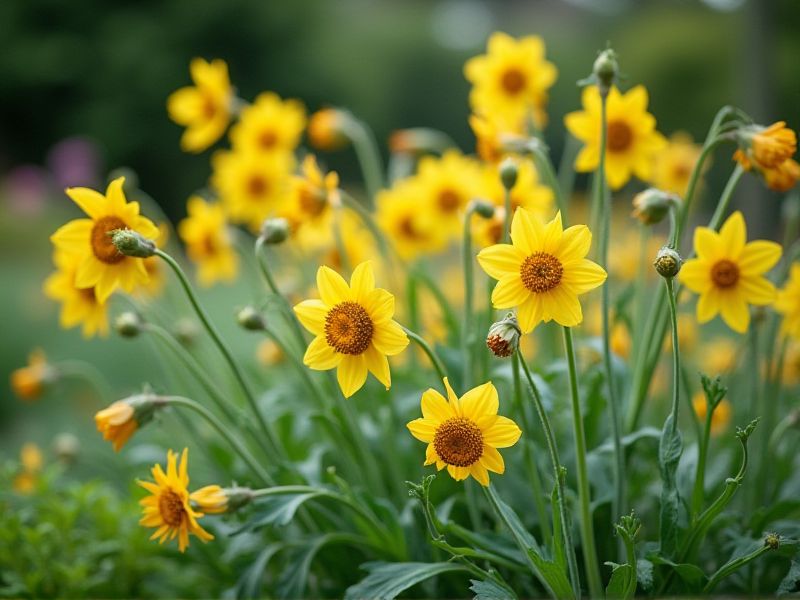
Perennial plants like lavender, sedum, and daylilies are ideal for low-maintenance gardens due to their resilience and adaptability. These species thrive in various soil conditions and climates, making them suitable for diverse landscapes. Lavender offers fragrant blooms and attracts pollinators, while sedum provides a vibrant ground cover with its succulent leaves. Daylilies bloom prolifically year after year, requiring little more than the occasional deadheading. Choosing these hardy perennials can enhance your garden's beauty with minimal effort.
List of some Perennial plants that require minimal maintenance
- Lavender (Lavandula)
- Coneflower (Echinacea)
- Black-eyed Susan (Rudbeckia)
- Hostas (Hosta)
- Sedum (Sedum)
- Russian Sage (Perovskia atriplicifolia)
- Yarrow (Achillea millefolium)
- Daylily (Hemerocallis)
- Catmint (Nepeta)
- Lamb's Ear (Stachys byzantina)
Important things about Perennial plants that require minimal maintenance
Drought Tolerance
Perennial plants that exhibit drought tolerance are ideal for low-maintenance gardens, providing resilience in dry conditions while requiring minimal water. Varieties such as lavender, sedum, and coneflower thrive in arid climates, offering vibrant colors and textures without demanding extensive care. Incorporating these resilient choices into your landscape can reduce irrigation needs and contribute to a sustainable garden. With their ability to conserve water and withstand heat, drought-tolerant perennials are an excellent solution for environmentally conscious gardening.
Pest Resistance
Perennial plants, such as lavender and coneflower, exhibit excellent pest resistance, making them ideal for low-maintenance gardens. These resilient varieties often produce natural compounds that deter common pests like aphids and beetles, reducing the need for chemical treatments. By incorporating these hardy plants into your landscape, you can create a vibrant ecosystem that thrives with minimal intervention. Regularly selecting pest-resistant perennials not only ensures a less labor-intensive gardening experience but also promotes biodiversity within your garden.
Soil Adaptability
Perennial plants exhibit remarkable soil adaptability, thriving in various soil types, from sandy to clay-rich environments. These low-maintenance varieties, such as daylilies and sedums, require minimal intervention, making them ideal for both novice and experienced gardeners. By choosing perennials that suit your local soil conditions, you can create a resilient landscape that conserves water and supports local wildlife. Their ability to establish deep root systems allows them to endure periods of drought, enriching the soil while enhancing overall garden biodiversity.
Low Fertilization Needs
Perennial plants such as lavender, daylilies, and sedum are ideal for low-fertilization gardens, thriving with minimal nutrient input. These hardy species are adapted to a range of soil conditions and often flourish in poor soils, making them perfect for sustainable landscaping. By choosing perennials that require little maintenance, you can create a vibrant garden that attracts pollinators and supports biodiversity. Incorporating these low-fertilization plants not only saves you time and effort but also promotes a healthier ecosystem in your outdoor space.
Winter Hardiness
Winter hardiness in perennial plants is crucial for ensuring they thrive through cold months without extensive care. Varieties such as Sedum, Helleborus, and Coneflower are known for their resilience, requiring minimal protection while offering robust growth for your garden. These plants not only withstand freezing temperatures but also need little attention when established, making them ideal for low-maintenance landscapes. By selecting winter-hardy perennials, you can enjoy a vibrant garden year after year with minimal effort.
Self-Sowing Capability
Perennial plants with self-sowing capabilities provide a low-maintenance option for gardeners seeking sustainable landscaping solutions. These resilient plants, such as *Echinacea purpurea* (purple coneflower) and *Lupinus perennis* (wild blue lupine), naturally disperse their seeds, promoting a continual cycle of growth and renewal without the need for extensive care. You'll appreciate how these species not only enrich your garden's biodiversity but also create vibrant, colorful displays year after year. By selecting self-sowing perennials, you can enjoy a flourishing landscape while minimizing your gardening time and effort.
Perennial Bloom Cycles
Perennial plants renowned for their minimal maintenance offer vibrant blooms year after year, enhancing your garden effortlessly. Varieties such as daylilies, sedum, and coneflowers thrive in various soil types and weather conditions, making them ideal for both novice and experienced gardeners. These resilient plants typically require less frequent watering and fertilization, allowing you to enjoy a beautiful landscape with reduced effort. By incorporating these low-maintenance perennials, you can create a stunning, sustainable garden that flourishes throughout the seasons.
Foliage Longevity
Perennial plants with long-lasting foliage, such as Hellebores and Sedums, offer vibrant greenery throughout the seasons while requiring minimal maintenance. These hardy species thrive in diverse environments, providing year-round visual interest without frequent watering or pruning. Selecting drought-tolerant varieties not only conserves water but enhances your garden's resilience against fluctuating weather conditions. By incorporating these low-maintenance perennials, you can enjoy a lush landscape with reduced effort and sustainable gardening practices.
Disease Resistance
Perennial plants known for their disease resistance are essential for low-maintenance gardening, offering vibrant foliage and blooms without demanding extensive care. Varieties such as daylilies and coneflowers are particularly resilient, thriving in various soil conditions while resisting common plant diseases like powdery mildew and root rot. Incorporating native plants, such as black-eyed Susans or asters, can enhance your garden's ecological balance, attracting beneficial pollinators while minimizing pest issues. By selecting disease-resistant perennials, you can create a sustainable, thriving garden that requires minimal intervention, allowing you to enjoy its beauty effortlessly.
Natural Pest Repellents
Perennial plants such as lavender, marigold, and catnip are not only visually appealing but also serve as effective natural pest repellents. These plants release essential oils that deter common garden pests like aphids and mosquitoes, making them ideal for a low-maintenance garden. Once established, they require minimal care and can thrive with little water, reducing your overall gardening workload. Incorporating these hardy perennials into your landscape can enhance its beauty while promoting a healthier, pest-free environment.
